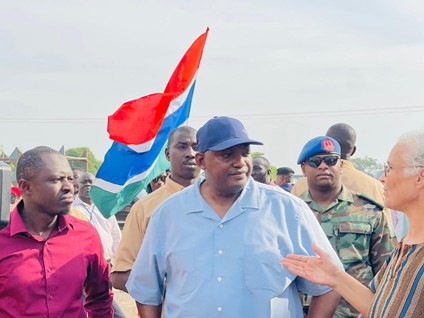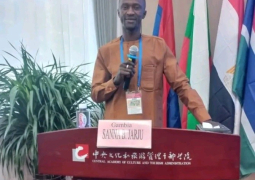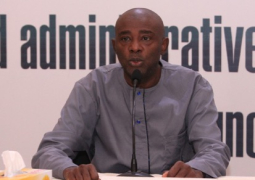
President Barrow described the establishment of a new agricultural training centre in CRR as a landmark initiative that will help bridge the country’s skills gap and empower Gambian youth with practical knowledge in farming and related trades.
The centre, developed in partnership with the MRC-Holland Foundation, is designed to provide hands-on training in agriculture, horticulture and livestock production.
Unlike Gambia College, which focuses largely on theory, the new institution will emphasise practical skills, enabling graduates to become professional agricultural workers, entrepreneurs, or even future lecturers.
A centre in the heart of rice production, Barrow said the location of the centre was deliberate, given CRR’s role as the “basket” of rice production in the country. “I think it is well located, and it can create a lot of jobs for the youth. Once they are empowered and trained, they can employ themselves, create employment for others, or even lecture in the future,” he stated.
The President highlighted that this was the first time livestock training would stand as an independent programme, reflecting government’s commitment to diversifying skills development.
Addressing the skills gap
Barrow acknowledged that the skills gap in The Gambia remains wide, but stressed that his government’s national development plan prioritises training in diverse fields including agriculture, livestock, welding, plumbing and electrical works. “This is the policy, and we want to replicate it in all regions. It is something I have been thinking about for six years,” he said.
He praised the MRC-Holland Foundation for its swift and efficient processes, contrasting them with government bureaucracy. “When it comes to education, they are always willing and ready. Their process is very quick – once they agree, they sign and start immediately. With government, it can take two or three years before processes are completed,” Barrow noted.
Infrastructure as the Foundation of Development
The President emphasised that infrastructural development is the bedrock of national progress. “Without infrastructure, even if you have all the ideas, you cannot implement them. That is why infrastructural development is very important, and it speaks for itself in what we are doing,” he said.
Barrow urged Gambians, particularly journalists, to report positively on such initiatives, stressing that the centre will have a transformative impact. “This will make a big impact. It will change people’s lives. You can be in Banjul or Brikama and come here to train. Even university students can spend three days here for practical training. This is the change we are trying to complete. This is what was missing,” he concluded.
Read Other Articles In Headlines
Gambia confirms 3 deaths, 148 new cases
Aug 24, 2020, 4:16 PM




